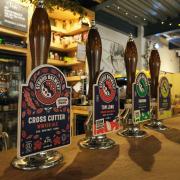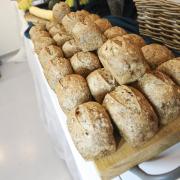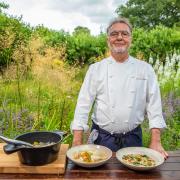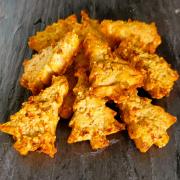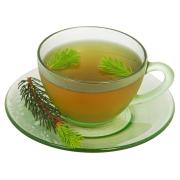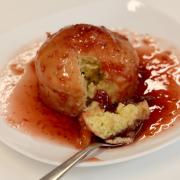The humble perry pear has potent champions in the form of Charles Martell and passionate young distiller George Lewis.
Charles Martell is known as the man who saved the Old Gloucester Cow and Single Gloucester cheese from almost-certain extinction. The Cotswold Life Food Hero now has a new cause: the embattled perry pear.
On his picture-postcard farm in Dymock, he’s using an ancient distillery to turn his traditional pear crop into Owler, the purest and mellowest of spirits. Not only does he own the oldest original still house that’s still working; he’s also employing George Lewis who, at 23, is the youngest distiller in Britain.
The youngest distiller in Britain?
We believe so. George is from an old farming family: his great-grandfather was a very keen fruit grower, who bought the farm next door to mine in the early 1900s. It’s thanks to him that we have records for many of the early apple varieties. George became interested in old perry pear trees while he was studying forestry. Before coming to me, he was working on a farm in Herefordshire, making cider and juices from traditional apple varieties.
And the oldest original still house that’s still working...
This still house dates back to the 1600s, and there are three important clues to the fact that it was purpose-built: firstly, the gable ends aren’t filled in, which is to let the smoke out; secondly, the original door was one-barrel wide; and finally, it only has one door, which is vital for security. Otherwise, as you’re going in one entrance, someone else is leaving from the other with a bottle they’ve nicked!
And when did you work all that out?
For years and years, we had no idea what the building’s original purpose could be. We even brought in two high-powered experts, who went away shaking their heads. They knew it couldn’t be a house because it was one big room; nor a livestock building because there was only one door, which was too narrow. Everything fell into place when a neighbour, who studies old documents, took a look at all our old deeds. They revealed the building was a distillery, owned by a Mr Hunt, which was closed down by government legislation in 1810. Funnily enough, I’d always thought distilling was something I should be doing.
Why closed down?
The Government of the time panicked because everyone was constantly drunk – men, women, children – thanks to the cheap London gin houses; it’s the subject of the famous William Hogarth ‘Drunk for a penny’ cartoon. So they brought in licensing laws, which closed down all the small distillers, causing terrible damage to the countryside – it destroyed a major part of our heritage. Some carried on illicitly, which I think is the origin of the jokey legend of the treacle mines. We’ve called our new drink ‘Owler’, the old name for a smuggler. Down by the Severn, they used to call them ‘Howlers’ with an ‘h’. I’ve got this vision in my head of them howling at night as a signal to call the ships in.
Talk us through the distilling process.
We pick perry pears from the farm, mash them up unpeeled, and then let them ferment for a few weeks. Once all the sugar has turned into alcohol, they’re fed into the still and gently heated using a wood fire. It’s actually very unusual to use a wood-fired still and takes a lot of skill from George, but it’s much greener.
We bring the mash up to 74.6 degrees (below boiling point), to evaporate the alcohol, which we then condense into a spirit. The process takes around three-to-four hours and it has to be overseen each step of the way: George is constantly checking where it’s at by smelling and tasting. The end product is incredibly pure and very strong – 86 per cent alcohol; we dilute it with spring water from the farm.
What are perry pears?
First of all, they grow within sight of May Hill in the three counties, but chiefly Gloucestershire. They’re small, astringent and largely inedible. There’s one called Flaky Bark and, if you can eat one, I’ll give you ten quid: it takes all the skin off the inside of your mouth! But they give Owler a wonderful flavour and, in general, they’re important for the countryside because they soften the climate by acting as a windbreak. You don’t get swallows in a cornfield: you get swallows in orchards, which should be grazed by cattle. And that’s what I want to see. That’s my landscape.
Which pear varieties do you have on the farm?
We still have some of the fruit trees that would have been used by Mr Hunt in his distillery. We’ve got Thorn, Green Longdon and Oldfield from the original trees; and then there’s Little Gennet, a grafted variety, which explains why it’s named after the offspring of a male horse and a female donkey! I’ve also done a lot of planting myself. We also use the pears for making perry for washing the Stinking Bishop cheese we make, though we’ve never sold it as a drink in its own right.
Let’s have some tasting notes on Owler...
Whereas some find Scotch a bit harsh, Owler is a very mellow, smooth drink. We bought our still from Germany, and the chap who came over to install it was amazed by the intense pear flavour. He said it knocked the spots off anything he’s tasted before. Nobody does anything similar with perry pears, as far as we know - not in England anyway.
Abroad, they’re doing ‘Poire William’, which irritates because it’s actually an English pear from Aldermaston: the French nicked it! Ours is a real luxury drink because the amount you get out of a batch of pears is tiny, but we don’t apologise for that. We’re making a good quality drink that won’t be going to any supermarkets.
Look out for Charles Martell’s Owler at licensed cheese shops, delis, and other independent outlets.





